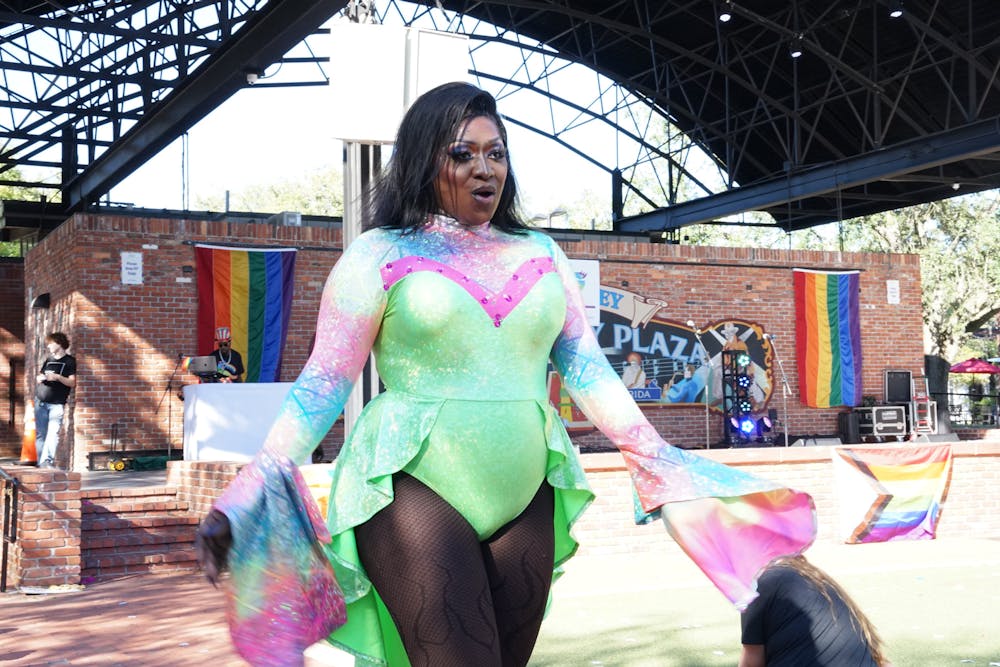To many, Black History Month is an interval of reflection to recognize the generations who spearheaded efforts toward equality. To others, it acts as a time to consider current improvements that can be made. To most, Black History Month marks a period of introspection about identity.
Black LGBTQ+ individuals can face unique challenges due to their intersectional identities, leaving their experience largely unaddressed by the communities they are a part of.
In Gainesville, a small — but developing — Black Queer community has emerged, generating valuable resources and kinship many individuals have never had access to.
Dayanna Peek, a 22-year-old UF international studies senior, celebrates Black History Month by honoring the trailblazers who’ve allowed Black people to “break down those barriers” the community faces.
“I visibly appear Black, and I visibly appear Queer,” Peek said. “My identities impact the way I navigate throughout the world, and it definitely impacts the way that individuals see me.”
Peek brands themselves as a DJ, freelance photographer and model. They take artistic inspiration and mix tracks from Black Queer artists like Steve Lacy and Victoria Monet.
“Black and Queer people deserve more credit … We do a lot for the artistic community,” Peek said. “We're very transparent about our pain and our past, and it really comes across in our music and our art.”
Peek co-founded the Lavender Living Learning Community, which offers gender-inclusive housing at UF. They also run the New Day Scholarship, a $500 scholarship for Black femme Queer UF students.
Jehlia Andrew is a 21-year-old UF psychology and African American studies junior, and a recipient of the Fall 2022 New Day Scholarship. From Kissimmee, they faced difficulties finding both an LGBTQ+ and Black community as they grew up.
“Queerness just didn’t exist there,” Andrew said. “It was hard tackling gender identity while I was navigating through middle school and high school.”
Andrew arrived at Gainesville with low expectations and was pleasantly surprised by the community they found. They’ve since involved themselves in a handful of student organizations for intersectional cultures, including the Black Student Union, UF Bridges Multicultural Outreach Program and the Black Queer Table at UF.
Since receiving the scholarship, they have developed a tight-knit circle of other Black Queer femmes to trust and rely upon, Andrew said.
One misconception they frequently encounter is the idea that one part of their identity is more important than another.
“This is not a pick-and-choose type of thing,” Andrew said. “I am equally affected by all issues that affect Black people and by all issues that affect Queer people.”
For many, like 22-year-old Nadia Morrow, the resources offered to the community still have a long way to go.
The UF graduate student struggles to find community because she is in a different stage of life than undergraduates, she said. Morrow takes online courses to understand her Blackness and Queerness instead.
“There were other people like me going through the same questions and experiences, and that helped to solidify my identity,” Morrow said.
Since arriving in Gainesville from Texas last year, Morrow has begun to be more loud and proud of her intersectional identities.
“It's very important to uplift [Black Queer] voices because it allows for people to become human in other people's eyes,” Morrow said. “What helps to lower prejudice is being able to relate and see the humanity in others, and you can only do that if you see them.”
Recent Florida legislation, such as House Bill 1521, which criminalizes transgender people for using the bathroom that matches their identity, and House Bill 1069, which prohibits instruction on sexual orientation or gender from Pre-K to eighth grade, bring significant concerns to the forefront of LGBTQ+ Floridians’ minds.
“It really causes a lot of fear and sadness,” Morrow said. “[It is] legislation that is going to cause isolation in the state and not in a good way.”
The prejudice the Black LGBTQ+ community faces has a substantial impact on both their mental and physical health.
According to a 2020 survey by the Center for American Progress, 95% of Black LGBTQ+ individuals reported discrimination has negatively affected their psychological well-being to a degree. Similarly, 83% of Black LGBTQ+ individuals reported an impact on their physical well-being.
Shantella Floyd is a Black registered mental health counselor intern at Appendix Inc.: Counseling Services, specializing in LGBTQ+ issues among a variety of other topics.
Common issues Black Queer clients face are coming out to their families and dealing with their religious backgrounds, Floyd said. The brutalization many of these individuals face on a day-to-day basis leads to trauma, which can severely affect their livelihoods.
Additionally, Black individuals experience elevated rates of mistreatment by medical professionals, which is derived from a history of racist practices in the medical field. The Center for American Progress survey found that 15% of Black LGBTQ+ reportedly faced negative or discriminatory treatment from a health provider in the year prior.
“One reason I became a therapist is because, at one point, I felt like I was not being heard,” Floyd said. “It’s so hard for the [Black Queer] community to find resources.”
Though the intersection of their Queer and Black identities brings a collection of challenges, Black History Month is a beacon of light for members of the community.
“It’s celebration, it’s reflection, it’s joy…but sometimes it can also be mourning,” Andrew said. “It’s a time to be unapologetically Black.”
Contact Molly Seghi at mseghi@alligator.org and Bonny Matejowsky at bmatejowsky@alligator.org. Follow them on X @molly_seghi @bonnymatejowsky.
Molly Seghi is a first-year journalism major at UF and a Fall 2023 Avenue Reporter. When not writing or journaling, she can be found at a live music event or working on her podcast “An Aural Account.”
Bonny Matejowsky is a fourth-year journalism major and editor of The Avenue. When she’s not writing, you can find her delicately crafting a Pinterest board or at a local thrift store.






